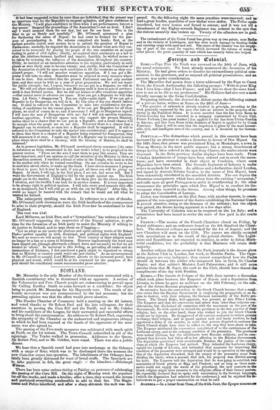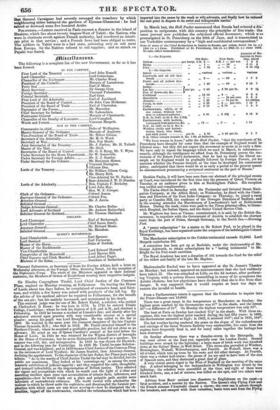ffortign anb Oolonfal.
Rom.—Pope Pius the Ninth was crowned on the 20th of June, with the usual ceremonies. We have already mentioned the formation of his Ministry. He had given orders to dissolve the extraordinary political com- missions in the provinces, and to suspend all political prosecutions; and an amnesty was under consideration. The Marseilles Sud quotes from a letter addressed by the Pope to Count Rossi, the French Ambassador, the following passage: " Write to your King that I love him—that I love France; and ask him to show the same kind- ness to me as he did to my predecessor." His Holiness had also sent antost friendly message to the Swiss Confederation.
Respecting railroads, the Journal des Debate quotes the following extract of a private letter, written at Rome on the 2Sth of June- " The question of railroads is already resolved in principle, according to the wish generally expressed by the men who take an interest in the progress of in- dustry in the Pontifical States. It is even asserted that the line from Rome to Civita-Vecchia has been conceded to a company represented by Count Cini. Prince Torlonia [the great banker] has applied for the line from Civita-Vecchia to Ancona; and that from Rene to the frontiers of Naples is applied for by Count Pianciani..Thus it will be seen that the impulsion is given by the most honour- able, rich, and intallip,ent men of the country, and it is favoured by the Govern- ment."
Pournear..—The distractions-which prevail in this country have been increased by an attempt to make a diversion in favour of Don Miguel. On the 16th June, that person was proclaimed King, at Montalegre, a town in Tras-os-Montes, in the most public manner; but a strong detachment of troops hiving been ordered to the spot from Chaves, the malecontents were dispersed. In the Beira province similar displays have been made. From Coimbra detachments of troopa have been ordered out to crush the move- ment; and have succeeded in their object at Condeixa, where some Miguelites have been seized. The Seventh Regiment of Infantry is under orders to embark for Oporto. An address and a declaration, dated London, and signed by Antonio Ribeiro Saraiva, in the name of Don Miguel, have been extensively circulated in the unsettled districts. The one depicts the disastrous consequences which have arisen from the. existing " usurpation," and calls upon all good Portuguese to assist in overthrowing it; the other enumerates the principles upon which Don Miguel is to conduct his Go- vernment when restored to the throne. Among other things, he promises to adopt the Constitution of Lamego. Lisbon was threatened; on the 21st June, with another emente, in conse- quence of the non-appearance of the decree establishing the National Guard. It proved abortive, owing to the firmness of the military; but the object was gained, the decree having appeared in a few days after.
The University of Coimbra was to be reopened on the let July; and a commission had been issued to revise the scale of fees paid in the courts of law.
Fuxseca.—The session of the French Chambers closed on, Friday, by Royal ordinance; and an ordinance issued on the Gth dissolved the Cham- bers. The electoral colleges are convoked for the 1st of August; and the new Chambers will meet on the 17th. The papers are- chiefly occupied with speculations as to the result of the. general election. The Legiti- mists and Republicans are expected to combine, in order to defeat Minis- terial candidates; but the probability is that Ministers will retain their majority.
Another subject that has occupied the Paris journals is the dinner given at the Reform Club in London, last week, to Ibrahim Pacha. The Oppo- sition papers are very indignant: they cannot comprehend how the Pacha should sit between the soldier who conquered him in Syria, Sir Charles Napier, and that soldier's Minister, Lord Palmerston; and it still more puzzles them that M. Soyer, the cook to the Club, should have shared the compliments of the day with Ibrahim.
Roses.—The Gazette de Cologne of the 30th June narrates a discussion which took place between the Emperor of Russia and a deputation front- Livonia, to whom he gave an audience on the 23d February, on the sub- ject of the Greco-Russian propaganda—
So extensive have the conversions to the Greek Church become, that a suspi- cion exists that the Russian Government is employing the propaganda as an en- gine to destroy, with their religion, the German nationality of the Baltic pro- vinces. The Grand Duke, heir-apparent, was present, as also Prince Lieven. The Emperor said that the conversions had arisen from other than religious con- siderations, but disclaimed all connexion with the movement on the part of the Government. No wish existed to disturb the provinces in the free practice of their religion; but, on the other hand, those who wished to join the Greek Church could not be rejected. He disapproved of all coercive measures to induce persons to change their religion; and to guard against rash and hasty resolves, he had appointed a delay of six months, in order that persona disposed to embrace the Greek Church might have time to reflect on the step they were about to take. The Emperor attributed the conversions complained of to the carelessness of the Lutheran clergy, and to the unhappy condition of the peasantry. The provinces were indeed German, but the inhabitants were Russian subjects; and he com- plained that Livonia had fallen off in her affection to the Russian Government. The deputation questioned with considerable freedom the justice of the conch', siona at which the Emperor had arrived. They defended the Lutheran clergy, upheld the loyalty of Livonia, and intimated that measures for improving the condition of the peasantry were arranged and would be in operation iu the spring. One of the deputation remarked, that the misery of the peasantry arose from dividing the lands• when a peasant died rich, his property was divided among his helm The Emperor told the deputation that he was going to establish two seminaries of Greek priests at Riga and Pleekow• and so long as these semi- naries could not supply the wants of the priesthood, the new converts to the Greek religion might have recourse to the religious offices of their former pastors. He repeatedly declared that he spoke with uncertainty in the German language, (which the deputation had selected for the conference,) and he enjoined his in- terlocutors to put a proper construction on what he said.
Atainna.—In a letter from Onus, of the 25thJune, the Epps announoN
that General Cavaignac had severely revenged the treachery by which neighbouring tribes betrayed the garrison of Djenma-Gliazaonat he had sabred or drowned some five hundred Arabs.
PoLveesta.—Letters received in Paris recount a disaster in the island of Huahine, which lies about twenty leagues West of Tahiti : the Natives, who were in obstinate revolt against French authority, had murdered an Ameri- can pilot in that service ; and a French force had been obliged to retire. The soldiers in Tahiti were in a bad state, subsisting only on salt meat from Europe, for the Natives refused to sell supplies; and an attack on Papeiti was feared.



























 Previous page
Previous page